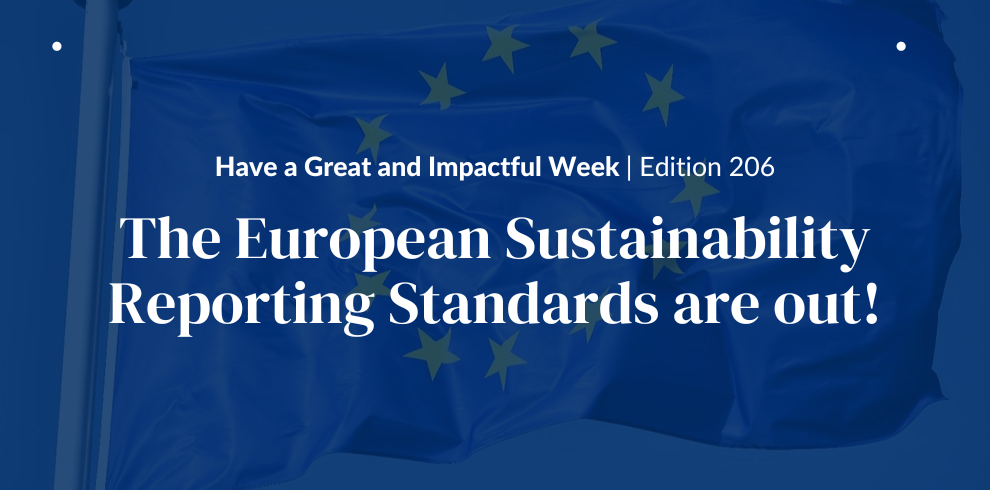
The most awaited common standards for companies to report under the Corporate Sustainability Reporting Directive (CSRD) were adopted by the European Commission on the last day of July and will take effect as of 1 January 2024 (assuming the European Parliament and the Council do not reject the Commission’s delegated regulation).
The first set of the ESRS rule that a company’s sustainability performance shall be reported including information related to short-, medium- and long-term time horizons and referring to both the company’s own operations and its value chain, as applicable. It shall contain:
- a brief description of the company’s business model and strategy;
- a description of the time-bound targets related to sustainability matters it has set;
- a description of the role of the administrative, management and supervisory bodies with regard to sustainability matters, and relevant expertise and skills or access to them;
- a description of the company’s policies in relation to sustainability;
- information about the existence of incentive schemes linked to sustainability;
- a description of the due diligence process implemented by the company with regard to sustainability;
- the principal actual and potential adverse impacts connected with the company’s own operations and with its value chain;
- any actions taken by the company in relation to actual or potential adverse impacts, and the result of such actions;
- a description of the principal risks the company faces related to sustainability;
- indicators relevant to the required disclosures.
These standards – which are sector agnostic, applying to all businesses under the scope of the CSRD regardless of which sector(s) the company operates in – aim to ensure that the sustainability information a company is required to report (in a single report comprising both financial and sustainability information) is reliable, transparent, comparable, and duly audited.
There are 12 ESRS, two cross-cutting (ESRS 1 e 2), and ten ESG topical standards (ESRS “E”, “S” and “G”):
Cross-cutting standards
ESRS 1 – General requirements
ESRS 2 – General disclosures
Environment
ESRS E1 – Climate change
ESRS E2 – Pollution
ESRS E3 – Water and marine resources
ESRS E4 – Biodiversity and ecosystems
ESRS E5 – Resource use and circular economy
Social
ESRS S1 – Own workforce
ESRS S2 – Workers in the value chain
ESRS S3 – Affected communities
ESRS S4 – Consumers and end-users
Governance
ESRS G1 – Business conduct
It is noteworthy that in order to ensure a high degree of interoperability of ESRS with other international standards, in preparing the EU’s draft standards, EFRAG (the European Financial Reporting Advisory Group, an independent, multistakeholder advisory body tasked by the European Commission to provide technical advice on the standards) worked closely with the Global Reporting Initiative (GRI)[1] and the International Sustainability Standards Board (ISSB). The latter aims at preparing sustainability reporting standards to be recognized and applied at global scale.
While the ESRS contain topical standards covering the full range of environmental, social and governance issues, the ISSB has so far published a detailed topical standard on climate only (the first ISSB standards are to become effective as of January 2024). In addition, and as required by the CSRD, ESRS explicitly require reporting on the company's impacts on people and the environment (impact materiality) as well as reporting on how social and environmental issues create financial risks and opportunities for the company (financial materiality) – assuming the so-called “double materiality” approach. The ISSB standards, in contrast, focus more exclusively on how social and environmental issues create financial risks and opportunities for the company (an inside-out financial materiality assessment).
In future years the European Commission is expected to adopt additional delegated acts for additional sets of standards. The CSRD requires the Commission to adopt by June 2024: sector-specific standards, proportionate (and less demanding) standards for listed SMEs (which are not required to report sustainability information until financial year 2026, with the possibility of an additional two-year opt-out until 2028), and standards for non-EU companies.
Some non-listed SMEs, which are not subject to any sustainability reporting requirements under CSRD, may nevertheless receive requests for sustainability information from customers (namely larger and listed companies directly subject to report under CSRD), banks, investors or other stakeholders. EFRAG is therefore also developing simpler, voluntary standards to be used by non-listed SMEs.
As a teaser, we highlight that in the Second Report of our Observatory of Sustainable Development Goals (SDGs) in Portuguese companies – which will be publicly released and presented on the 3rd of October –, we will start to unveil the interactions between the ESRS and the SDG.
We invite all our dear readers to joint us in the venue by registering here!
[1] Last week EFRAG and GRI confirmed, through a joint statement, that they have achieved a high level of interoperability between their respective standards in relation to impact reporting: News - EFRAG.
Have a great and impactful week!
Angela Lucas
Advisor at the Center of Responsible Business & Leadership
This article refers to edition 206 of the "Have a Great and Impactful Week" Newsletter.
Subscribe here to receive the weekly newsletter.